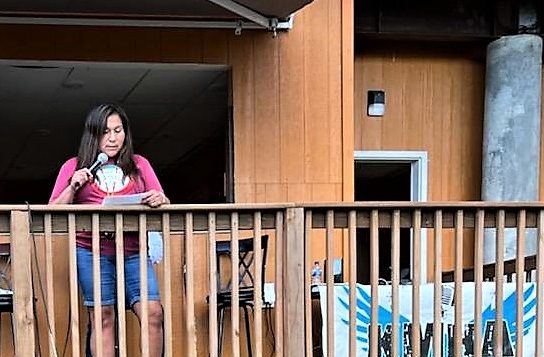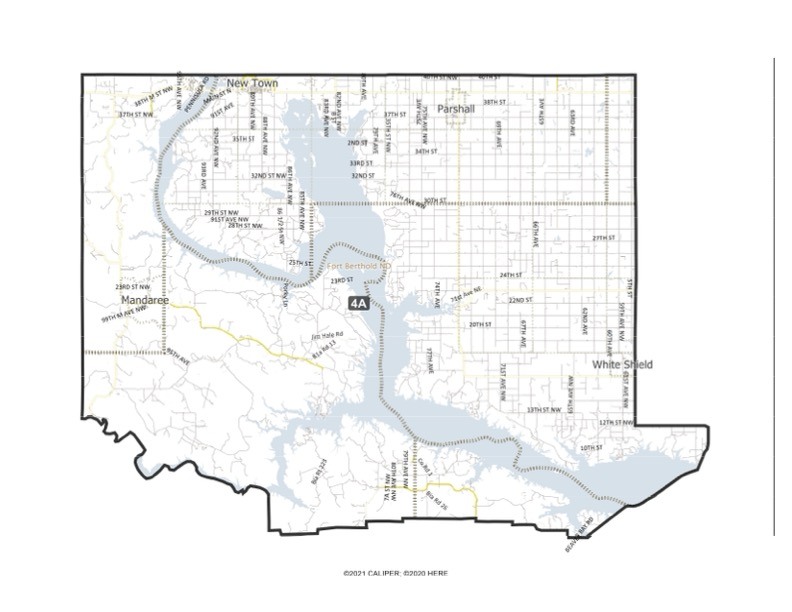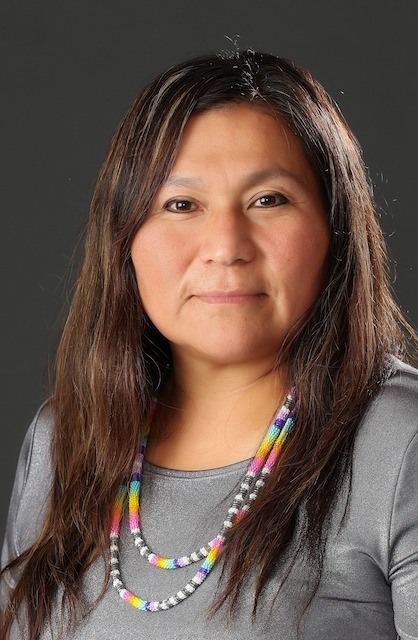News Based on facts, either observed and verified directly by the reporter, or reported and verified from knowledgeable sources.
With new Native voter district, reservation community health champ aims for North Dakota Legislature
 DeVille delivered a campaign speech at White Shield’s powwow on July 9.
Photo courtesy of Lisa DeVille.
DeVille delivered a campaign speech at White Shield’s powwow on July 9.
Photo courtesy of Lisa DeVille.
Mandan, Hidatsa and Arikara Nation citizen Lisa Finley Deville could win the first seat ever created for a new state legislative voting district on the Fort Berthold Reservation. That marker matches yet another milestone. Early voting for North Dakota’s Nov. 8 general election begins in September clearing a path to the polls for voters.
“It’s very exciting because we also open that path for other Native Americans who run in the future,” DeVille, 48, told Buffalo’s Fire.
In 2020, when DeVille ran for North Dakota’s District 4 Senate seat, she doubted she would win even though she had a track record in politics and broad support from fellow reservation residents. The shape of the legislative district that included the Fort Berthold Reservation, however, pitted Native voters against an off-reservation majority.
She lost that race, but later helped convince lawmakers to recognize the district boundary inequity. Ultimately, the Native American Voting Rights Coalition – including North Dakota Native vote of which DeVille once served as a board member — and U.S. Census partners led a successful redistricting effort in North Dakota.
Lawmakers were in the throes of redrawing voter district boundaries after the 2020 U.S. Census as mandated by the state Constitution. Time was on DeVille’s side. New census numbers showed Fort Berthold Reservation population growth in District 4 justified the creation of a new legislative district.
The redistricting committee kept at-large voting for the district’s only Senate seat. But committee members did agree to make one historic change. They split District 4 into two separate single-member contests for the House. Voters in the area can now elect a representative in the new Native-majority Subdistrict 4A. At the same time, the committee created a new Subdistrict 4B, which comprises a non-Native majority.

Gov. Doug Burgum signed the Legislature’s unprecedented districting maps into law on Nov. 12, 2021, in time for DeVille to throw her hat into the Democratic primary election ring. The redistricting “gives us hope because now Fort Berthold is guaranteed the chance for the spot in the House,” DeVille said. “We finally get this voice at the table when decisions about our lives are being made.”
As the democratic nominee for Subdistrict 4A, DeVille will square off against Republican incumbent Terry B. Jones. Under the previous district boundaries, Jones would have run at-large as one of two candidates in the predominantly off-reservation former District 4 race. Unhappy with the changes, Republican Party leaders sued over the new voter map boundaries.
District 4 Republican Chair Charles Walen of New Town, located on the Fort Berthold Reservation, charged Gov. Burgum and Secretary of State Alvin Jaeger with violating the U.S. Constitution. The lawsuit asked a federal court to bar the subdistrict election. The plaintiffs cited the 14th Amendment’s Equal Protection Clause prohibiting “gerrymandering for which race was the predominant factor.”
Co-plaintiff Paul Henderson, a Republican House candidate in District 9, also asked the judge to invalidate Subdistrict 9A, which legislators drew around the Turtle Mountain Reservation. The suit claims, “The Legislative Assembly made no statistical analysis or inquiry regarding voting history or racial creation of the subdistricts.”
“They don’t come and visit us. I’ve never seen them come to me and ask me anything. We may have been here for hundreds of years, but still, they don’t know who we are.”
Lisa Deville,first native candidate to represent new subdistrict 4a on the Fort Berthold Reservation
DeVille joined the Mandan, Hidatsa and Arikara Nation to intervene as a defendant in the lawsuit. “Without subdistricts, both of District 4’s representatives in the State House would be elected at-large by a majority non-Native population, and Native Americans’ voting power would be overwhelmed by white bloc voting against the Native candidate of choice,” they said. The subdistricts are necessary to afford Native voters “an undiluted vote and to comply with Section 2 of the Voting Rights Act,” they argued.
The North Dakota U.S. District Court sided with the state and tribes. A three-judge panel denied the plaintiffs’ plea to call off the elections, while indefinitely postponing a final decision on the merits of the case.
DeVille then came up against another roadblock. She missed the candidate registration deadline. After successfully challenging the Democratic Party’s lack of access to registration information, she then went on to gather enough petition signatures to get her name on the primary ballot.
She won her primary race. “The journey to gain our own legislative seat with Native representation has been difficult but it is now a reality,” she said at her acceptance speech in Mandaree. DeVille commended her competition, Thomasina Mandan, for running. She also thanked voters for putting her over the top. Since then, DeVille has been campaigning at powwows and rallies throughout the summer.
Her big task remains getting out the vote. She has two campaigners from each of Fort Berthold’s six segments going door to door in addition to about 100 volunteers. She tells audiences: “Stay engaged and stay involved. I didn’t get this far without you. Please encourage your friends and family to get to the polls for the general election.”
The matriarchs of her family have helped with fundraising by sponsoring events, preparing feasts, obtaining t-shirts, and purchasing yard signs. Her achievements over a dozen years of volunteer work — already well known by some — underpin her Hidatsa name Mah-eah-zah Ah-gaw-gish or Accomplishes Everything. She received the North Dakota Human Rights Coalition Arc Justice Award in 2015 for her environmental defense activities.
A lifelong resident of Mandaree, DeVille was forged amid the flares of the fracking fields at the core of the Bakken shale oil and gas play. She combined traditional Indigenous knowledge with a college education in environmental science to help form the grassroots Fort Berthold Protectors Of Water and Earth Rights, POWER. For that, NEXUS Media News named her one of “Eight Native American Leaders Working for Climate Justice”.

She received a Master of Business Administration and Master of Management from the University of Mary in Bismarck. She and her oldest son graduated together with bachelor’s degrees in environmental science from Nueta, Hidatsa and Sahnish College.
POWER has led many actions to inform communities. “Every day black smoke containing particulate matter has been visible at well sites around us,” according to a 2016 letter titled “Up in Black Smoke.” “The venting of gaseous and invisible harmful air pollutants is only detected by infrared camera. As tribal residents of rural Mandaree on Fort Berthold Indian Reservation, we support the proposed BLM methane flaring and venting reduction language.”
DeVille has testified before state, tribal, federal, and UN forums developing policy and regulations for health, social issues, taxes, education, and protecting women and children in the oilfields. She is a board member of Dakota Resource Council and of the Western Organization of Resource Councils. She also served on the National Environmental Justice Advisory Council (NEJAC) in Washington, D.C.
She insists she is “not against oil and gas.” However, she says, “I believe we can do a better job at protecting the environment and our health. What I want is industry to be held accountable. We have also learned the hard lesson of human trafficking and the increasing epidemic of Missing Murdered Indigenous People. We need to hold true to our values and continue to seek responsible development and keep all our relatives safe.”
A recent school activity to prevent fentanyl overdose was one of many she and her husband Walter DeVille Sr. have supported to defend students from drug traffickers. Among other community service projects, they have kept open the Mandaree post office, backed church events, and captained school supply drives. The force behind numerous local development plans, DeVille said community project success is typically initiated by a needs survey.
The approach, she said, sets her apart from previous district candidates. “They don’t come and visit us. I’ve never seen them come to me and ask me anything. We may have been here for hundreds of years, but still, they don’t know who we are. They don’t know what we live with here in the Bakken. I’ve seen it; I’ve lived the struggle with my people,” she told Buffalo’s Fire.
“How oil and gas, climate change, are impacting our health and our environment, and the increase in drugs: Those are the things that I’m going to take to the table.”
Corrections:
Editor's note: This story includes additional redistricting partners:
Ultimately, the Native American Voting Rights Coalition – including North Dakota Native vote of which DeVille once served as a board member -- and U.S. Census partners led a successful redistricting effort in North Dakota.
Dateline:
SPEARFISH, S.D.
